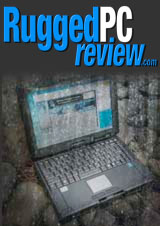Teguar TA-5940-16
Modular fanless All-In-One Touch Kiosk PC
(by Conrad H. Blickenstorfer)
Share on:



Teguar is a catchy name, and an increasingly familiar one as the Charlotte, North Carolina, based company is a hard-charging, rapidly growing provider of industrial and medical computers.
Launched in 2010 by a Swiss native with years of experience in industrial computer systems, Teguar prides itself in combining American adaptability and technological leadership with Swiss precision, quality, and attention to detail. In this article we're taking a detailed look at one of the company's line of modular fanless All-In-One PCs.
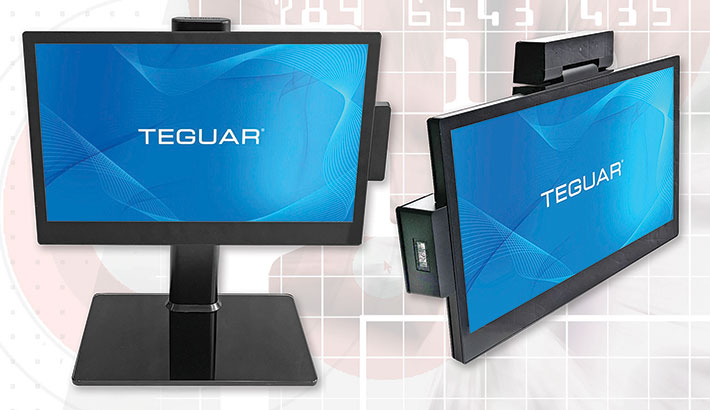
What are All-In-One PCs? In the broadest sense they are panel computers — PCs that combine monitor and computing electronics in one shallow box that can be mounted in panels or numerous other ways. Dell, HP, Lenovo, Apple and many others make All-In-Ones for home, business and the enterprise. But those are not tough and durable enough for many commercial and, even more so, for industrial applications.
Teguar saw a niche there, somewhere between an iMac and an industrial Panel PC. Something that's versatile, available in various sizes, tougher than consumer tech, and customizable to numerous markets via modular expansions. And that is the company's TA-5940 line of fanless All-In-One computers.
The picture above shows the 16-inch TA-5940-16 version of the TA-5940 line, equipped with some of the available bolt-on expansion modules.
What distinguishes Teguar's TA-5940 Series of fanless All-in-One touch computers?
All-in-Ones are popular because they merge the traditional PC "tower" and desktop monitor into one slender package, saving space and eliminating cabling. Most consumer and business All-In-Ones look pretty much the same, but that's not always the case with AIOs designed for commercial and industrial markets. There you see products specifically built for sectors that have specific requirements in performance, interface, functionality, durability, ruggedness, sealing, materials or special properties. Manufactures may specialize on one type or another, or they may have various product lines geared towards those specific market requirements.
Teguar's TA-5940 series of fanless All-in-One computers is such a product line, one that targets a wide variety of Point of Sale and kiosk applications. What are the requirements for the POS/kiosk market, and what sets these Teguar AIOs apart?

- Sleek, modern look — Kiosks and POS systems are important points of contact that leave an impression. That's why the TA-5940 models have a sleek, elegant, modern look.
- Display and touch — Kiosks and POS systems must be easy to read and operate. That's why all TA-5940 models have full HD displays with responsive projected capacitive touch screens.
- Add-on modules — The three larger TA-5940 models have expansion connectors on all four sides for add-on modules such as 3-Track MSR, fingerprint reader, NFC reader, 2D barcode scanner, camera with microphone, and Verifone VX820 or Ingenico payment terminals).
- Mounting options — Consumer All-in-Ones have a stand and that's that. POS/kiosk All-in-Ones like the Teguar TA-5940 can be mounted in numerous ways. VESA hole patterns in the back allow access to an almost infinite variety of stands, mounting arms, panels, brackets, clamps, etc.
- Plentiful I/O — While consumer All-in-Ones have basic I/O, TA-5940 offers more. Half a dozen USB ports, legacy Serial, LAN, DisplayPort and cash register.
- Maintenance and upgrading — Consumer All-in-Ones are pretty much closed systems. All but the small 12-inch model of the Teguar TA-5940 models have a removable box PC on the back for easy maintenance and upgrades.
- Silent operation — Almost all consumer All-in-Ones need fans. Which can mean distracting noise, unwanted air movement, and a point of failure. The Teguar TA-5940 Series uses passive cooling and doesn't need a fan.
- Scalable size — Kiosks and POS systems have various size requirements. The Teguar TA-5940 Series comes in display sizes ranging from 12 to 22 inches.
As mentioned above, the TA-5940 Series of POS/kiosk All-In-Ones is just one of many industrial AIO computers that Teguar offers. Other Teguar lineups start at small 10-inch display models all the way up to 22 inches and larger. While consumer All-in-Ones are general purpose computers and must be equipped to handle a wide variety of workloads, industrial designs are often deployed for very specific tasks. Which means they are offered with a variety of CPU options. No need to spend extra when it's not needed.
The table below shows the Teguar TA-5940 Series of fanless All-in-One lineup as of Spring 2023:
|
Teguar TA-5940 Series Fanless All-in-One PCs
|
|
Company
|
Teguar
|
Teguar
|
Teguar
|
Teguar
|
|
Model
|
TA-5940-12
|
TA-5940-16
|
TA-5940-19
|
TA-5940-22
|
|
Screen size
|
11.6"
|
15.6"
|
18.5"
|
21.5"
|
|
Screen resolution
|
1920 x 1080
|
1920 x 1080
|
1366 x 768 (opt. 1920 x 1080)
|
1920 x 1080
|
|
Screen pixel per inch
|
190 dpi
|
141 dpi
|
85/119 dpi
|
102 dpi
|
|
Screen aspect ratio
|
16 : 9
|
16 : 9
|
16 : 9
|
16 : 9
|
|
Screen luminance
|
300 nits
|
300 nits
|
250 nits
|
300 nits
|
|
Touch
|
PCAP
|
PCAP
|
PCAP
|
PCAP
|
|
Intel CPU
|
Celeron J6412
|
Celeron J6412
|
Celeron J6412
|
Celeron J6412
|
|
Intel CPU options
|
Core i3 and i5
|
Core i3 and i5
|
Core i3 and i5
|
Core i3 and i5
|
|
removable PC
|
no
|
yes
|
yes
|
yes
|
|
RAM
|
4/8/16GB in 1 DDR4 SO-DIMM
|
4/8/16GB in 1 DDR4 SO-DIMM
|
4/8/16GB in 1 DDR4 SO-DIMM
|
4/8/16GB in 1 DDR4 SO-DIMM
|
|
Cooling
|
Passive - Fanless
|
Passive - Fanless
|
Passive - Fanless
|
Passive - Fanless
|
|
Storage M.2
|
1 x M.2 2280
|
1 x M.2 2280
|
1 x M.2 2280
|
1 x M.2 2280
|
|
Serial
|
2 x COM RS232
|
2 x COM RS232
|
2 x COM RS232
|
2 x COM RS232
|
|
Expansion
|
No
|
No
|
No
|
No
|
|
USB Type-A
|
2 x 2.0, 2 x 3.0
|
2 x 2.0, 2 x 3.0
|
2 x 2.0, 2 x 3.0
|
2 x 2.0, 2 x 3.0
|
|
USB Type-C
|
2 x 3.0 (1 powered)
|
2 x 3.0 (1 powered)
|
2 x 3.0 (1 powered)
|
2 x 3.0 (1 powered)
|
|
LAN
|
1 x RJ45 GbE
|
1 x RJ45 GbE
|
1 x RJ45 GbE
|
1 x RJ45 GbE
|
|
DisplayPort
|
1 x Mini DP
|
2 x Mini DP
|
2 x Mini DP
|
2 x Mini DP
|
|
Speakers
|
1 x 3 watt
|
1 x 3 watt
|
1 x 3 watt
|
1 x 3 watt
|
|
Wi-Fi
|
802.11ac
|
802.11ac
|
802.11ac
|
802.11ac
|
|
Bluetooth
|
BT4.2 + LE
|
BT4.0 + LE
|
BT4.0 + LE
|
BT4.0 + LE
|
|
Scanner
|
opt. 1D/2D
|
opt. 1D/2D
|
opt. 1D/2D
|
opt. 1D/2D
|
|
NFC
|
optional
|
optional
|
optional
|
optional
|
|
Fingerprint Reader
|
optional
|
optional
|
optional
|
optional
|
|
3-track MSR
|
optional
|
optional
|
optional
|
optional
|
|
Camera
|
opt. 5MP webcam
|
opt. 5MP webcam
|
opt. 5MP webcam
|
opt. 5MP webcam
|
|
IP rating
|
IP54 Front Bezel
|
IP54 Front Bezel
|
IP54 Front Bezel
|
IP54 Front Bezel
|
|
Humidity
|
20-85% non-condensing
|
20-85% non-condensing
|
20-85% non-condensing
|
20-85% non-condensing
|
|
Temp range
|
32F-95F
|
32F-95F
|
32F-95F
|
32F-95F
|
|
Enclosure
|
Black plastic
|
Black plastic
|
Black plastic
|
Black plastic
|
|
VESA Mount
|
Yes (VESA 75)
|
Yes (VESA 75 and 100)
|
Yes (VESA 75 and 100)
|
Yes (VESA 75 and 100)
|
|
Size (mm)
|
277 x 181 x 41
|
370 x 235 x 43
|
453 x 273 x 51
|
518 x 310 x 50
|
|
Weight
|
3.1 lbs (1.4 kg)
|
6.6 lbs (3.0 kg)
|
9.7 lbs (4.4 kg)
|
11.7 lbs (5.3 kg)
|
|
Power Input
|
19V DC 4-pole DIN
|
19V DC 4-pole DIN
|
19V DC 4-pole DIN
|
19V DC 4-pole DIN
|
|
Product specs
|
TA-5940-12
|
TA-5940-16
|
TA-5940-18
|
TA-5940-22
|
|
Product page
|
TM-5040-16
|
TM-5040-18
|
TM-5040-22
|
TM-5040-22
|
The table above shows the major specs of all four of the currently available models in the TA-5940 Series of fanless All-In-One PCs. There may be more in the future, but the current lineup covers most common POS and kiosk applications. Unlike other Panel PC, monitor or AIO series Teguar offers, the TA-5940 is, apart from size and weight, remarkably homogenous in terms of performance, features and functionality.
While many industrial panels and monitors still come with older legacy 1024 x 768 or 1366 x 768 resolution that's been used for decades by terminals, and for which a vast wealth of industrial software has been formatted for, POS and kiosk systems generally benefit from higher resolution. All TA-5940 models come with FHD displays, suitable for complex screen layouts and good graphics representation.
Note that display luminance — perceived brightness — is at 300 nits, a bit more than a standard consumer laptop, and suitable best for indoor applications.
All of the models in the series are fanless, i.e. they can make do with the passive cooling provided by their metal chassis. As of this writing we are not sure if fanless cooling also applies to models using Intel Core i3 and i5 processors, as those are not available yet. The Intel Celeron J6412 processor, which we'll discuss in more detail further down, is a modern 10 watt design that should have no problem running with passive cooling.
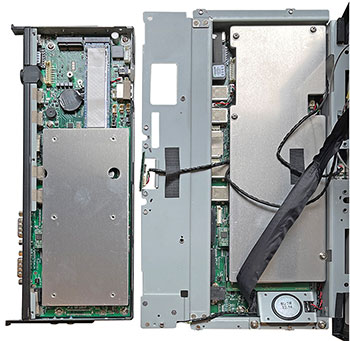 Mass storage for all models comes in the form of a single M.2 2280 style solid state SATA storage module.
Mass storage for all models comes in the form of a single M.2 2280 style solid state SATA storage module.
All models have external power supplies, with the same 19 Volt input voltage. Since these kinds of systems will be used in stationary deployments, there is no need for battery or wide voltage range input.
Note one substantial difference between the four TA-5940 models: While the three larger versions have the same modular box PC that slides into the monitor housing, the smallest (12-inch) version doesn't — its electronics are built-in and therefore can't just be replaced with a repaired or upgraded/updated slide-in PC module. The picture to the right shows the slide-in module of the 16-inch model on the left compared to the built-in PC of the 12-inch version on the left.
Weight is fairly modest for all four systems. At 3.1 pounds, the 12-inch version weighs barely more than a ruggedized tablet, even the largest one, the 22-inch model, weighs less than 12 pounds.
Now let's take a closer look at the 16-inch TA-5940-16 All-in-One sample unit Teguar sent RuggedPCReview.com for evaluation.
Teguar TA-5940-16 — a solid All-In-One touch kiosk
Interestingly, in its promotional and technical materials, Teguar describes each of the four members of the TA-5940 line differently. The TA-5940-16 version with its 15.6-inch screen headlines as a "All-in-One Touch Kiosk." We're not totally sure why Teguar's marketeers went that way, but a 16-inch display, like that of a large laptop, indeed seems uniquely suited for kiosk applications. Their displays must not be so small as to look cramped or difficult to read, and not so large as to become too bulky or get lost in.
Below is a look at the TA-5940-16 from the front and from all four sides:
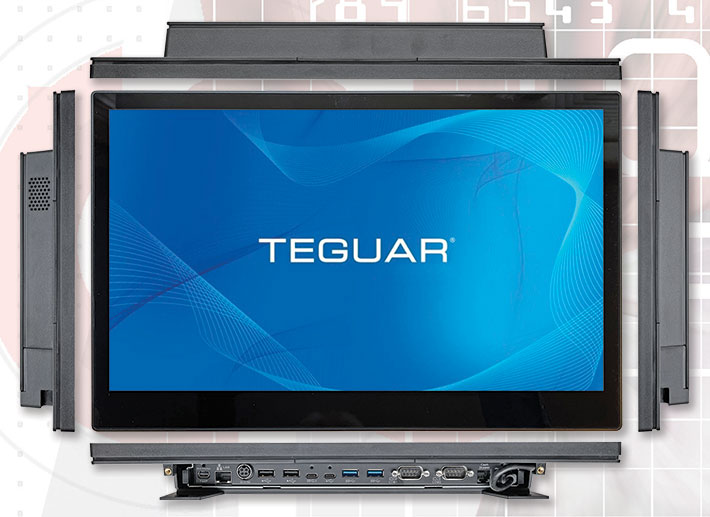
With a flush front bezel measuring 14.6 x 9.3 inches, the TA-5940-16 looks like a large tablet or the screen of a big laptop. The side views reveal a slender monitor case barely over half an inch thick, and then a system box on its backside. The whole thing is just 1.7 inches deep, which means it can fit almost anywhere.
In terms of construction, the device consists of steel and black polycarbonate plastic. But not all plastic is equal. Teguar generally uses PC+ABS-FR(40) where PC+ABS stands for PolyCarbonate + Acrylonitrile Butadiene Styrene, which is an alloy that combines the strength of polycarbonates with the high abuse resistance of ABS. And FR(40) indicates the type of flame-retardant material, in this case a halogen-free organic phosphorus compound.
As referred to above, the three larger versions of the TA-5940, including the 16-inch version described here, use a modular box PC that easily slides into the monitor housing. The sole connection between the monitor and the PC module is via what looks like a mini DisplayPort cable and connector, but uses a proprietary format. The advantage of this approach is that not only can the module easily be replaced with, for example, a new one or upgraded one, or one with a different memory or processor configuration, but memory, storage or component upgrades are simple as well.
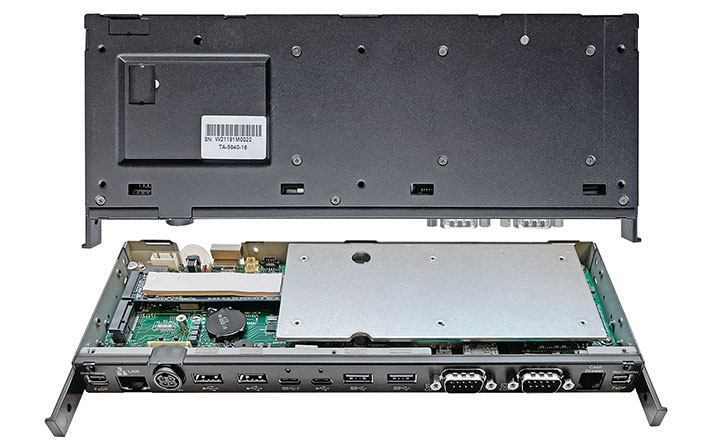
As for construction, the 10 x 3-3/4 x 5/8 inch PC module is all steel. The thick steel plate covering much of the system board serves as heat sink. To the left of it is the M.2 2280 style SATA SSD, in our eval unit a Kingston 128GB module. On top of it is a strip of thermal transfer material. When the PC module is in place, all interface ports are facing down, as shown below.

While back in the day, point-of-sale systems often relied on glacially slow modem dial up to verify cars and log transactions, TA-5940 models are well equipped with all sorts of I/O.
On the image above, from left to right you can see:
- FE DisplayPort connector to attach a second display
- An RJ45 gigabit Ethernet LAN port
- The 4-pin 19 Volt power jack
- Two USB 2.0 Type A ports
- Two USB 3.0 Type-C port, one of them powered
- Two USB 3.0 Type A ports
- Two legacy DB9 COM ports
- An RJ11 "Cash Drawer" port
- The second FE DisplayPort jack that connects the monitor and the PC module
Note that the FeDP connectors are a proprietary solution to connect up to two different displays with a single cable to provide power, USB for touch, and even Audio.
As far as ruggedness goes, this is not an inherently mobile devices, hence no drop specs and such. The TP-5940-12 is designed to be used in a temperature range from 32 to 95 degrees Fahrenheit, and its front panel is IP54 rated. That means modest environmental protection. It can handle a bit of water spray from all direction, but in general these units are designed for indoor use.
Modular expansion
Almost no two kiosk or point-of-sale implementations are ever exactly the same, and that's why customization and expansion options are important. That's often done through expansion bays inside a device or special expansion connectors outside. 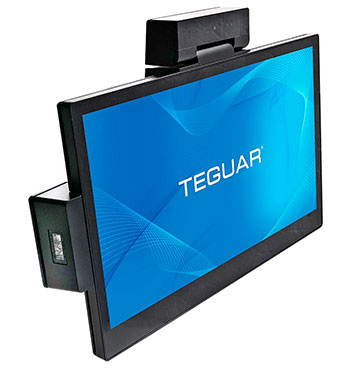 The problem with that approach is that customers may have a choice of optional functionality, but it's often an either/or situation where only some of the required features can be installed.
The problem with that approach is that customers may have a choice of optional functionality, but it's often an either/or situation where only some of the required features can be installed.
Teguar came up with a solution that allows for installation of up to four simultaneous options in the three larger models in the line. This is done via a series of bolt-on peripherals that very easily installed in the center of each of the four sides of a TA-5940 unit. Simply pop off a small plastic cover, connect a module to the interface micro-USB port, secure the module with two screws, and you're done. No dangling cables, no extra devices, just extra functionality.
Each of these modules can be connected to any of the four ports. An additional advantage is that modules can be easily removed and installed in another unit, wherever a certain functionality is needed. This kind of deploy-as-needed approach can save time and money.
Currently available bolt-on expansion peripherals include modules for mag stripe reading, a video camera, NFC, a biometric module, and a barcode scanner. All of these modules use the same color, material, and design as the TA-5940 units, making for an elegant, integrated look. The pictures below show the camera and the bar code scanner modules.
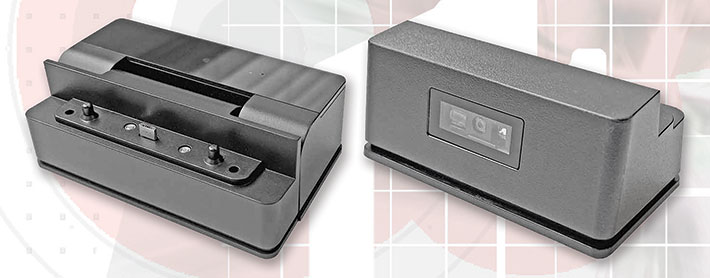
Intel "Elkhart Lake" processor
Unlike general purpose PCs and laptops, which generally benefit from as much performance as possible to cover all bases, dedicated commercial and industrial systems are better off with "targeted" performance, i.e. as much as is required for the job. Since kiosk and POS systems performance requirements are well defined and generally far lower than for tasks like complex rendering or modelling or other compute-intensive workloads, there's no need to pay for performance that'll never be needed (nor the extra heat generated).
That said, since even kiosks or POS systems (or almost anything else, for that matter) may be complex and resource-intensive, vendors of industrial and vertical market systems often provide their products with scaleable performance or with different classes of processors. And that's what Teguar does with the TA5940 line. There are lower and higher end processor options.
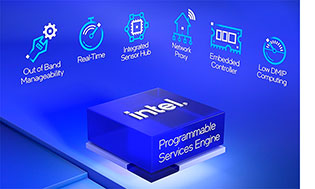 On the high end it is as of yet unspecified Intel Core i3 and i5 processors, the kind that can do heavy lifting. On the lower end, and as the default configuration, there's the Intel Celeron J6412. It gets a little confusing there because Intel has been using the "Celeron" brand for budget-friendly lower end chips for a good many years, but has lately begun using them both for low-end Core processors as well as for higher-end Intel Atom-based chips. The Celeron J6412 that's used in the TA-5940 is of the latter variety.
On the high end it is as of yet unspecified Intel Core i3 and i5 processors, the kind that can do heavy lifting. On the lower end, and as the default configuration, there's the Intel Celeron J6412. It gets a little confusing there because Intel has been using the "Celeron" brand for budget-friendly lower end chips for a good many years, but has lately begun using them both for low-end Core processors as well as for higher-end Intel Atom-based chips. The Celeron J6412 that's used in the TA-5940 is of the latter variety.
"Elkhart Lake" is Intel's code name for a line of processors that, while based on an Intel Atom architecture that's simple compared to the high-end Intel Core architectures, were enhanced to meet the specific needs of IoT — Internet of Things — "edge" devices.
What does "edge" mean in this context? "Edge computing" refers to using technology at the edge of the ever-growing range of networks. That includes systems on the road, in the field, and in everyday situations, which includes electronic payments, point of sale systems, kiosks, and other deployments AIOs like the TA-5940 were designed for. The growing importance of all that processing performed at the outermost levels of network requires more connectivity, more bandwidth, and higher levels of security enabled right through new generations of processors, and that was what the Elkhart processor platform was designed to support.
Making full use of all of the new features that Intel baked into "Elkhart Lake" CPUs depends on software, systems and network architects, and it is largely invisible to users. Those interested may wish to peruse Driving Performance, Integration, and Versatility with Intel's First Enhanced for IoT Platform. What users will see is significantly enhanced processing and graphics performance compared to earlier systems running economy processors.
To provide an idea of the relative performance of the TA-5940-16, we ran the system through the full roster of our standard benchmark suites. For comparison we added the results of the smaller 12-inch version of Teguar's TA-5940 line of fanless AIOs, and also those of three other Teguar products running on Intel Core, Pentium and Celeron CPUs. Here are the results:
|
Teguar TA-5940 Series vs other Teguar products
|
|
Performance
|
Teguar
|
Teguar
|
Teguar
|
Teguar
|
Teguar
|
|
Model
|
TA-5940-12
|
TA-5940-16
|
TP-3345-16
|
TB-3445
|
TRT-5280-12
|
|
Type
|
AIO
|
AIO
|
Panel
|
IPC
|
Tablet
|
|
Year tested
|
2023
|
2023
|
2021
|
2021
|
2021
|
|
Processor
|
Intel Celeron
|
Intel Celeron
|
Intel Pentium
|
Intel Celeron
|
Intel Core
|
|
Processor Model
|
J6412
|
J6412
|
N4200
|
N3350
|
i7-8550
|
|
CPU base/turbo Speed
|
2.40/2.60 GHz
|
2.40/2.60 GHz
|
1.10/2.50 GHz
|
1.10/2.40 GHz
|
1.80/4.00 GHz
|
|
Cores/Threads
|
4/4
|
4/4
|
4/4
|
2/2
|
4/8
|
|
PassMark 6.1
|
2,563
|
3,356
|
1,336
|
1,211
|
3,042
|
|
PassMark 9
|
1,702
|
1,757
|
1,339
|
879
|
3,688
|
|
PC Mark 10
|
2,133
|
2,219
|
1,697
|
1,206
|
3,856
|
|
- PC Mark Essentials
|
5,066
|
5,353
|
4,214
|
3,478
|
7,991
|
|
- PC Mark Productivity
|
3,086
|
3,190
|
2,331
|
1,892
|
6,120
|
|
- PC Mark Digital Content
|
1,685
|
1,739
|
1,353
|
725
|
3,181
|
|
PC Mark Drive
|
568
|
628
|
731
|
NA
|
NA
|
|
3DMark Time Spy
|
205
|
209
|
189
|
NA
|
452
|
|
Geekbench 5 Single Core
|
584
|
575
|
318
|
323
|
1,080
|
|
Geekbench 5 Multi Core
|
1,769
|
1,754
|
1,155
|
609
|
3,429
|
|
Geekbench 5 Open CL
|
2,199
|
2,243
|
2,529
|
720
|
5,742
|
|
CrystalMark
|
205,670
|
209,067
|
154,432
|
107,511
|
292,508
|
The results of the benchmark testing are interesting and much in line with what we've learned from benchmarking many hundreds of rugged mobile and panel computers.
First, while the number of different Intel chips is absolutely bewildering and can lead to great confusion in making purchasing decisions, after all is said and done it all boils down to a fairly simple rule: A typical mobile Intel Core processor will be roughly half again as fast overall as a higher-level Atom-based Atom/Celeron/Pentium branded processor. That's not precise science, but as a rule of thumb it's what you'll find. While the four Atom architecture systems listed above use three different Intel processors, those processors all work about the same, although they may have, as is the case with the new "Elkhart" chips, include new and enhanced features and capabilities.
Second, what does make as much or more of an overall performance difference than the processor is storage. Hard disks have long since been replaced by much faster solid state disks, but not all solid state disks are the same. There's a big performance difference between different types, technologies, and brands. Keep that in mind.
Third, with all of the confusion over Intel's processor proliferation and naming conventions, the basics still hold: Core processors outperform Atom processors, by a lot. Within Core processor families or generations, "Core" branding outperforms Pentium, which outperforms Celeron. Within Atom processor families or generations, Pentium branding outperforms Celeron branding, which outperforms Atom branding. However, a new high-end Atom architecture chip may come close in performance to a several generation old Core architecture chip.
What does all of this mean in respect to deciding between the default "Elkhart" processor in Teguar PA-5940 AIOs versus ordering them with a Core processor option (when those become available)? That entirely depends on the application.
Teguar TA-5940-16 — Summary
With their fanless TA-5940 Series (currently available with 12, 16, 18 and 22 inch screens), Teguar created a type of All-in-One computer suited for all sorts of point-of-sale, kiosk, or similar applications. The units have an elegant, modern look, and they are thin and light enough to be placed almost anywhere.
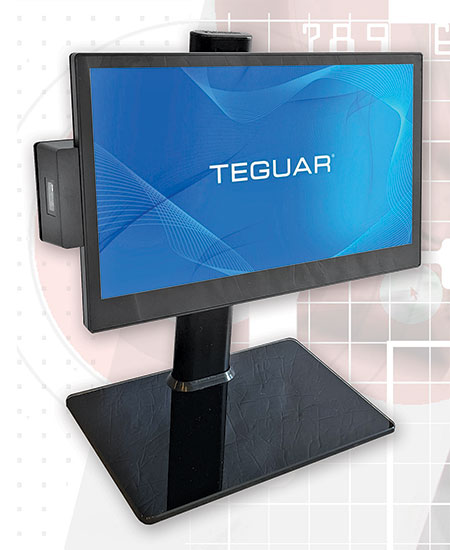 Powered by either a quad-core "Elkhart Lake" Intel Celeron J6412 processor specifically designed by Intel for "edge computing" applications, or an Intel Core i3 or i5 chip, the TP-5940 line covers a performance range wide enough for a broad range of indoor touch terminal deployments.
Powered by either a quad-core "Elkhart Lake" Intel Celeron J6412 processor specifically designed by Intel for "edge computing" applications, or an Intel Core i3 or i5 chip, the TP-5940 line covers a performance range wide enough for a broad range of indoor touch terminal deployments.
Equipped with very responsive projected capacitive touch, the TA-5940 Series offers a wealth of onboard connectivity, both state-of-the-art and legacy. In addition, Teguar provides a variety of easily switchable bolt-on modules for MSR, scanning, NFC, ID, and camera.
What further distinguishes the line (except for the small 12-inch model) is its modular design not only with respect to modular bolt-on peripherals, but also by using a replaceable PC module. This makes service, upgrades, replacement, or deploying modules where they are needed easy.
Also of interest is that the Windows or Linux-based TA-5940 roster of touch-based All-in-Ones has a Qualcomm ARM CPU-based sister lineup of Android All-in-Ones in the TA-Q5340 Series. —
Conrad H. Blickenstorfer, March 2023
Teguar TA-5940-16 Industrial All-in-One Specs
| Added/changed |
Full review 03/2023
|
| Type |
Industrial All-In-One Touch Kiosk
|
| Processor |
Quad-core Intel Celeron J6412, 1.5MB L2 Cache |
| Processor speed |
2.00 GHz (Max 2.60 GHz Burst Speed) |
| TDP |
10 watts |
| Thermal |
Fanless passive cooling |
| Modular PC unit |
no (integrated) |
| OS |
Windows 11 Windows 11IoT, Linux IoT |
| Graphics |
Intel UHD Graphics for 10th Gen Intel Processors |
| Memory |
4G, 8GB, or 16GB DDR4 SO-DIMM in one socket |
| Display type |
LED-backlit TFT LCD with 300 nits luminance |
| Display size/res |
15.6" 1920 x 1080 pixel (141 ppi) |
| Digitizer/Pens |
Projected capacitive touch |
| Keyboard |
Optional |
| Storage |
M.2 2280 SATA II SSD module |
| Multimedia Pocket |
None |
| Expansion slots |
None
|
| Housing |
PC+ABS polycarbonate and steel; VESA 75 and VESA 100 mountable. |
| Temperature |
32° to 95°F (0° to 35°C) |
| Humidity |
20 to 85% non-condensing |
| Vibration |
NA
|
| Spill Resistance Class |
IP54 (front panel)
|
| Drop spec |
NA |
| Certifications |
CE, FCC Class A, LVD |
| Size |
(14.6 x 9.3 x
1.7 inches (370 x 235 x 42 mm) |
| Weight |
6.6 pounds (1.7 kg) |
| Power |
19Volt DC |
| Optional |
1D/2D Barcode
Scanner, NFC, 3-Track MSR; Fingerprint Reader, VidCam |
| Communication |
Intel Dual-Band 802.11ac WiFi + Bluetooth BT4.0 + LE module |
| Interface |
2 x USB 2.0 Type-A, 2 x USB 3.0 Type-A, 2 x USB 3.0 Type-C (1 powered), 2 x COM, 1 x RJ45 gigabit LAN, 1x RJ11 (for cash drawer), 2 x Mini DisplayPort, 1 x 3 Watt speaker |
Price |
Inquire |
| Web page |
Teguar TA-5940-16 |
| Product brochure |
 Teguar TA-5940-16 spec sheet (PDF) Teguar TA-5940-16 spec sheet (PDF) |
 Teguar — 1-800-870-7715
Teguar — 1-800-870-7715
www.teguar.com
